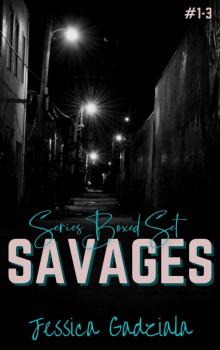- Home
- Gadziala, Jessica
The General Page 2
The General Read online
Page 2
Her eyes were pretty, just shy of big, bright, almost startling blue. So much so that I couldn't help but wonder if they were contacts.
But, see, it was impossible to tell if she was pretty beyond the great body, the perfect, gleaming blonde hair, the stunning shade to her eyes.
Because her entire face was wrecked.
See, I hadn't been around, but I had buddies around who kept me up-to-date on the goings-on in Navesink Bank. So, while I didn't know from watching actual news clips or anything about the situation, I knew the general story. One night, Senator Ericsson's son was beating his wife. In a case of wrong place and wrong time, one of the Mallick boys came upon them and nearly beat the man to death.
He served nearly a decade behind bars once the senator and his team got the right lawyers, hushed up the wife, had her lie on the stand.
They somehow managed to spin the story to omit the bit about how the spousal abuse was a factor, bleached the shit out of that dirty laundry.
But standing before me was the proof that while it got buried, while her voice got stifled, she had been doomed to a life of unknown beatings.
Like she had endured earlier in the night. Which I knew because the bruises were getting dark, her blood was drying.
A gun was in her right hand at her side. The other held her cell, the fingers on each white with pressure.
I tried not to wince at the black eyes, the bloody nose, the split lip, the fingerprints pressed into her throat, around her wrist like a bracelet. Her cheeks were fat, swollen from angry fists.
I didn't need to lose focus, to think of what she may have endured leading her to shoot the bastard after so many years.
I needed to keep her from spending the rest of her life in jail.
So I couldn't wonder if her eyes were small and red from crying... or pain from her injuries. I couldn't walk over to her, wrap an arm around her, and tell her everything was alright now.
Because it wasn't.
Right then, in that moment, nothing was alright.
Except her dead husband.
That was the only right thing in the whole situation.
"Okay. I am going to sound clipped and callous right now, Mrs. Ericsson. I'm not trying to be offensive. I just need to get this job done. So I need you to stay as calm as you are right now and work with me, okay?" She gave me a tight little nod. "Okay. How long ago was this?" I asked, looking down at the bloodstain again, trying to discern the level of drying.
"Fifteen minutes?" she guessed, shaking her head like she was trying to clear it. "No more than thirty."
"Good." That was really good. This could still be fixed. "I can't make this disappear, okay? I know you know we can do that. But we can't do that. Not with someone this high profile. So we need to make this seem like a robbery gone wrong sort of thing."
"Okay," she agreed and I noticed her lips were trembling, but her gaze was clear and steady.
"You are going to need to talk to the police. Then the detectives. Then the senator. Then his people. So you need to get this memorized. You need to be convincing."
"I can do that," she agreed, voice getting stronger. Sure.
"I imagined you've had to fake it a lot in your life with this fuck," I agreed.. "Now tell me about that gun. Yours? His? Legal? Not?"
"It's his and it's legal."
"Have you ever touched it on the inside? Cleaned it? Loaded the bullets yourself?"
"No."
"Are you sure? It's important."
"I hate guns. I've never touched it before."
"Okay, I need you to come closer over here, give it to me," I said, pulling thick leather gloves over my hands, reaching for wet wipes in my jacket. The bleach kind, not the baby. She moved stiffly across the floor, stopping at her late husband's feet, holding her shaky arm out to me. I took the gun, wiped it, then slipped it into my pocket. It would be found in the gutter down the street. "Here," I said, pulling out wipes for her. "You need to scrub at your hands and arms, under your fingernails," I instructed, watching as she started. "Here, for your chest and face and dress," I added when she handed me those first few sheets back. "All gunshot residue needs to be gone," I explained.
"Okay." She didn't question, just followed orders. She was smart enough to know how important this all was.
"I need your phone," I added, watching as she stiffened. "You called my office before you called the police," I explained. "They can't find that phone. Does he have one?"
"In his jacket pocket," she told me.
"Okay. Here is how it goes. This part is going to suck for you. But it has to happen." I could have sworn she mumbled something about how everything sucked for her, but I wasn't sure. "You need to drop down on top of his body, get the blood all over your knees and skirt. Touch his chest like you had tried to push the blood back in."
To my surprise, she didn't comment, didn't hesitate, just moved to do exactly as I ordered. Even went further, laid her body over his like a grieving wife would. She was good. Thank God.
"Now. Where did he beat you?" I asked. "In the house," I clarified.
She flinched back at the truth of those words, but didn't hesitate to answer. "The kitchen."
"Okay. Here is the story," I told her, squatting down next to his body to scrape under his nails into a baggy. He clearly beat her a lot. His skin had hardened up. His knuckles hadn't even broken open. Terrible for her, but also good. Her blood in his knuckles would be hard to explain. "You were in the kitchen. What were you doing?"
"Making tea."
"Okay. Good. Best to stick with the facts. You were in the kitchen making tea and he was..."
"In the study."
"Okay. So instead of him coming in and beating you, someone else came in. Is there a door in the kitchen?"
"Yes."
"To the garage or backyard?"
"Backyard."
"Perfect. I will unlock it. I will leave boot prints in and out and unlock the door. Someone came in that way. But you didn't hear him. And then he beat you. You didn't see a face. You blacked out when he got his hands around your throat. Use different words. Say you don't know what happened. Your vision swam. Next thing you knew, you woke up propped against the counter. Not on the floor. If you were on the floor, you'd have a head injury or have left blood from your face on the tile. You had slumped against the cabinet. And then you heard your husband yelling. Then you heard the pop. As you moved out that way to try to help your husband, the man rushed past you with a gun. Bumped into your shoulder, making you knock against the wall. Don't be too technical, but give details. People remember things. Their memories trip back in. You rushed in here, trying to save your husband, but he was already not breathing. You reached for his phone and called the police. And, if this is possible, sweetheart, I am going to need you to cry. Your voice will need to shake. Your words tumble together."
On cue, her eyes welled up.
Thank God for good clients.
"I can do it," she assured me, reassuring herself as well. "I have to," she added with a nod as the tears started to stream down her cheeks.
There was an odd, almost overwhelming urge to reach out, to wipe the tears from her cheeks. It was asinine. In this job, women crying was nearly a daily occurrence. You had to harden to it, choose to use calming language and rationality to get it to stop.
I never wanted to wipe them away before.
"Yes, you do. Now about the police call. Crying. Hysterical. That goes without saying. But here is the thing. Guilty people try to convince during a cop call. Innocent people try to relay facts. Help! My husband was shot. He's shot. Please help. He's not breathing. Please hurry. That kind of thing. Don't try to say where you were, when you noticed he was shot. Just answer their questions and keep begging them to hurry. To help. Keep giving them updates. His heart isn't beating. Oh God, his heart isn't beating. It's not complicated, but it is very important." I moved to stand, looking around, trying to see if there was anything else important I might have miss
ed. I moved back to the front door, re locking it. People might forget to lock their back door, not likely their front. "Mrs. Ericsson," I called as she reached in his jacket to pull out his cell to make her call. "I'm sorry about this," I said, reaching to touch some of the blood on her chin, wincing myself when she winced. "I just need the blood for the back door. Now, I am going to go change and show back up after all the cops file out. And then we can talk. But now, you need to appear to fall the fuck apart while actually keeping it together. This is the hardest part. If you can successfully get through the questioning, the rest will be much easier. Do you think you remembered it all?"
"I used to memorize textbooks," she supplied oddly. "I can do this," she added, her voice already starting to hitch, get worked up.
"A couple hours. That is it," I promised her, moving back a few feet. "Count to one-hundred then call. I will be long gone by then," I said, following the blood trail on the floor, going through the kitchen, wiping the blood on both the handle and the inside of the jam. Then, stifling the urge to go back and listen, make sure she was doing okay on her phone call, I jumped in a circle, creating boot impressions in the mud leading away from the house.
I slowed my pace after tossing the gun in the gutter, not wanting to draw suspicion if anyone happened to be looking out their windows - unlikely at this house.
Getting back to my truck, I took off the boots, the gloves, tossed them and the wet wipes in a bag, wiping off her phone, then slipping it in my back pocket as I changed my shoes, sealed the bag, pulled my car further up the driveway, punching in the code for the garage that I knew because I had been there when it was set up, and parked my truck next to his two cars - black SUV, black sports car. And I sat and waited.
I heard the sirens.
Sat and waited some more, praying she was able to pull it off as I flipped on the police blotter, hoping to catch some chatter.
There wasn't much.
But there was also no word of bringing her in.
It was almost three and a half hours later when the lights stopped flashing, turned off, drove away.
But it was still too soon for me.
The uniforms were gone. The body likely also. But there was a chance a detective was still there. Or the Senator.
When I was sure it was safe enough, I pulled back out of the garage, tossing my bag in the pail, texting Finn to come pick it up and really dispose of it all.
And then I drove to her house, parking unabashedly in her driveway.
Because Quinton Baird & Associates did a lot of things. Like private security.
That was my new position in her life, one that could be questioned and verified.
When I let myself in the house, I found her sitting in the library, visibly shaking, face streaked with tears, eyes puffy, lips trembling.
One look said two things at once.
She'd held it together enough to pull it off.
And she was coming apart at the seams now.
TWO
Jenny
I don't know what made me snap.
My life, after all, had become predictably horrific. If such a thing existed. And I guess it did. For all the women like me, trapped in a home with a man who made use of her like a punching bag. Walking around on tiptoes lest the eggshells crack.
It wasn't surprising that he came home in a rage. In fact, that was more common these days than him coming home in a good mood.
I couldn't say for sure, of course, but I had suspicions that something was altering his mood. Not the drink. That was in the earlier days of our marriage. Until his father thought he was too sloppy at an event, causing him to all but quit alcohol altogether. Bertram Ericsson had that impact on people. Most especially his son.
All it would take was a condescending brow raise or a disappointed head shake.
But occasionally, there would be a situation - like his drinking - when he would use his dad-voice and Teddy's full name.
We need to talk, Theodore.
But Teddy didn't function well without some respite from life. Never mind that his life was a lucky one, a blessed one, that he had never had to know hunger or cold or heat if he didn't wish to, that he never had to suffer ridicule for wearing what could only be called rags to school, that he never wanted for anything in his life, that he barely had to work but got to live in a grand mansion, got to take vacations anywhere in the world he wanted, could drive the newest and most ridiculous cars without having to worry about how to pay for them.
But, I think, that was the problem for those raised with silver spoons in their mouths, with gilded high chairs. They never had to work for anything. Their minds and bodies always idle, creating too much space for unwarranted dissatisfaction to burrow in and set down roots.
And unlike the whiskey, the scotch, the vodka, there was no scent for his father to find distasteful, embarrassing.
So he had gotten away with whatever this new vice was for years. And only I seemed to realize the extent to which it was overtaking his life.
Maybe because I was the one who felt the brunt of it when he didn't get his fix, or was coming down from it, so I was the one to notice it.
He went out in the morning, likely showing his face at the company he supposedly ran, though anyone who knew things knew that Bertram Ericsson really ran the place even though he made a show of being a full-time, dedicated public servant. Teddy couldn't order a different kind of ink for the office without his father's permission. Then, well, who knew where he went. To his country club, out trolling for women, who knew. All I did know was he was rarely home for dinner and usually not even before nine or ten at night. On many weekends, I didn't even have to see the man.
But many nights, he came home angry at the world, at himself, at his circumstances in life, and he took it out on me. The one person in his life that he had such power over, knowing I was truly stuck, had no way to get away from him. At least not unless I was willing to pay the price for that. And I wasn't.
I would endure it every day if I had to.
And when I heard the door slam, heard the sound of the lock fiddling, a hand slapping the wood when he couldn't get it to engage, the curse as he did so, I braced myself, shutting off the tea kettle, knowing what was coming.
His footsteps were clipped, purposeful as he made his way through the dining room and into the kitchen. It was my favorite room in the house. Not because I got to cook there.
We have staff for that, I was informed when I said I wanted to cook him dinner when we were first married. I don't need you slaving away cooking and cleaning like some blue-collar wife with a bunch of snot-nosed brats clinging to you.
I couldn't cook. Or clean. Or do my laundry. And I damn sure couldn't work. It never occurred to him how hollow a life was without a purpose.
Regardless, though, I loved the kitchen. Even if all I got to do in it was make my tea - a small concession the staff allowed since I wanted it frequently and they wouldn't be able to scrub and wash and prepare things in this giant, empty house if they were constantly brewing me tea.
It was the kind of kitchen I had dreamed of as a little girl. In fact, the kitchen was larger than the home I sat in dreaming of this kitchen.
It was all white. And as a little girl full of garish, awful colors, of dirt and filth, all I dreamed of was clean and white.
Walking into the house the day after Bertram gave it to us as a wedding present a few months after our actual marriage, I felt like I had gone to heaven. White cabinets, silver pulls. Stainless steel oversized fridge, stove with eight burners, a dishwasher that had a separate compartment for just a handful of dishes to do. Like on the Saturdays when the staff left by noon or Sundays when they didn't come at all and I had a few dishes - oatmeal bowl, teacup, salad bowl, dinner plate if we didn't happen to have a social engagement. Which was unlikely.
The countertops were white quartz. The bowl full of apples and pears on the island was white. The lights over the island, the floors. Everything white. Big.
Roomy. Airy. A place you felt like you could take a deep breath.
But that wasn't necessarily why it was my favorite room.
No.
It was because it was the only room in the entire house that Teddy hadn't laid a hand on me in. Mostly because he never had reason to step inside it. And when he was home, neither did I.
The master bedroom was my least favorite room. Also the place he first hit me under this roof, held me down.
The master bath.
The guest room when I'd tried to sleep there one night.
Library.
Living room.
Great room.
The backyard.
The laundry room where I had been standing trying to get bloodstains out of my clothes before putting them in the bin for the staff.
The gym in the basement.
The second guest room that was set up as my sort of girl cave, full of the frilly things he'd never let me have in the rest of the house.
Even the downstairs powder room.
He'd beaten me everywhere.
Except the kitchen.
So hearing his footsteps moving toward this room, my safe space, the only room in the house that didn't make my belly clench a bit when entering it, made a prickle of dread work its way up my spine, down my jaw.
"Who the fuck are you all dressed down for?" he growled at the nightie he bought because he told me he refused to be married to a woman who wore sweatshirts or plaid pajama sets to bed, spitting the words like they were expletives. When I said nothing because he didn't want an answer, not really, because I'd learned that answering usually only made it worse, he charged at me. "You fucking slut."
Slut.
That was his favorite pet name for me.
Bitch was a close second, but he really got his jollies off saying slut as though there could be any truth in it. Me, the seventeen-year-old virgin he had taken to bed when he was well into his twenties. The girl he'd waited eight months after that to ask to marry him.

 The Rise of Ferryn
The Rise of Ferryn Lock You Down
Lock You Down What The Heart Learns
What The Heart Learns The Woman in the Trunk
The Woman in the Trunk Virgin
Virgin The General
The General Ugly Sweater Weather NEW
Ugly Sweater Weather NEW Roderick
Roderick The Negotiator
The Negotiator Savages Boxed Set
Savages Boxed Set The Middle Man
The Middle Man Revenge - Reckless Renegades 1
Revenge - Reckless Renegades 1 The Client
The Client Love and other Nightmares
Love and other Nightmares Escape From The Green
Escape From The Green Andi and Niro
Andi and Niro The Sex Surrogate
The Sex Surrogate The Babysitter
The Babysitter What The Heart Wants
What The Heart Wants Dr. Chase Hudson (The Surrogate Book 2)
Dr. Chase Hudson (The Surrogate Book 2) For A Good Time, Call...
For A Good Time, Call... What The Heart Finds
What The Heart Finds What The Heart Knows
What The Heart Knows